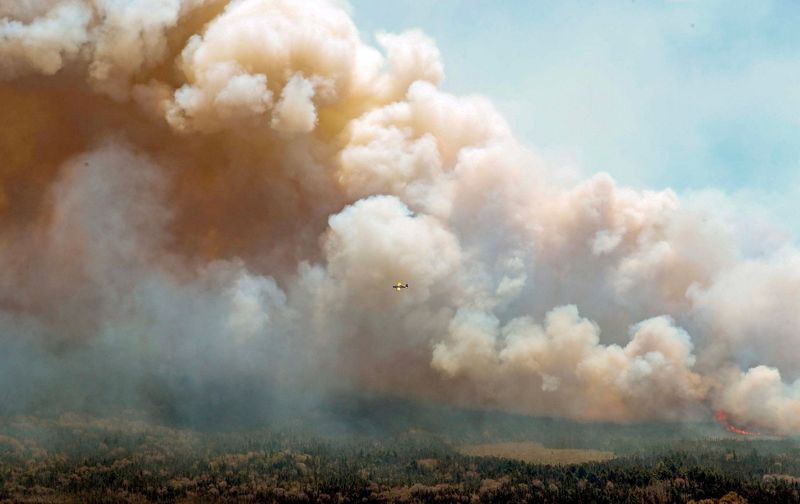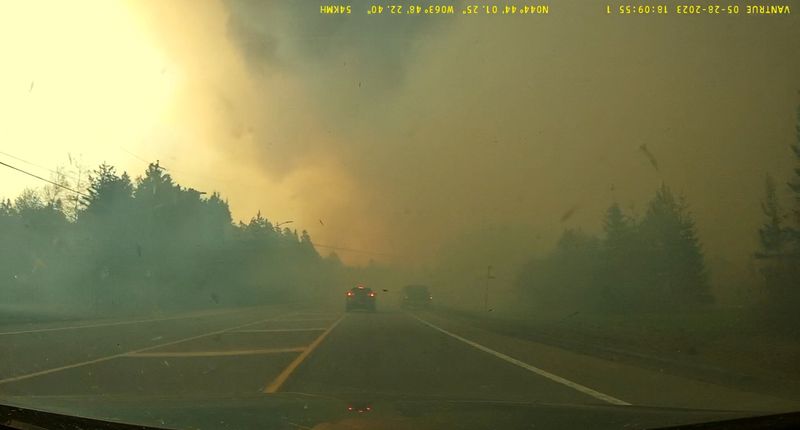By Nia Williams
(Reuters) -Wildfires are common in Canada's western provinces, but this year the eastern province of Nova Scotia is reeling from its worst-ever wildfire season, forcing the federal government to send in the military.
The Atlantic province has had nearly 200 wildfires so far this year that have burned more than 22,000 hectares and displaced more than 25,000 people. In 2022, there were just 152 fires that burned 3,390 hectares.
Across Canada, some 2.7 million hectares have been scorched so far this year, equal to more than five million football fields, federal Minister of Emergency Preparedness Bill Blair told reporters on Thursday.
HOW UNUSUAL ARE WILDFIRES IN NOVA SCOTIA?
Situated on Canada's eastern seaboard, Nova Scotia's climate is heavily influenced by the North Atlantic Ocean, which brings higher humidity and more moderate temperatures than many other parts of the country. Fires are not unusual but tend to be much smaller than those in the west.
The region is covered by what is known as the 'Acadian Forest', which contains plenty of broadleaf trees like sugar maples mixed with evergreens such as conifers. Broadleaf trees are less flammable than evergreens because their branches and leaves are further from the ground, and their leaves hold more moisture.
The Acadian forest is much less prone to large wildfires than forests in western Canada.
WHAT'S CAUSING THEM?
Atlantic Canada received low snowfall this winter, followed by an exceptionally dry spring. Nova Scotia's capital Halifax received just 120 millimetres of rain between March and May, roughly a third of the average, according to Weather Network meteorologist Michael Carter.
A scorching late May heatwave pushed temperatures in Halifax to 33 degrees Celsius (91.4 F) on Thursday, around 10 degrees Celsius above normal for this time of year.
Most of the wildfires are believed to be accidentally caused by human activity.
Ellen Whitman, a research scientist with the Canadian Forest Service, said there is also speculation that trees felled during Hurricane Fiona, which hit Atlantic Canada in September 2022, or killed by an infestation of forest pests may be providing more fuel than usual for wildfires, but that theory requires further investigation.
WHAT ROLE IS CLIMATE CHANGE PLAYING?
Whitman said it is difficult to determine the impact of climate change on a single fire season, but Atlantic Canada has been much hotter than usual and scientists expect temperatures in the region to continue to rise in coming years.
For coastal regions climate change is expected to bring more rain, which should reduce the risk of wildfires, but a warmer atmosphere is more efficient at pulling moisture out of soils, a factor that increases fire risk.
Widespread spring fires across the whole of Canada are also unusual, and research shows fire seasons across North America are getting longer.
WHAT'S THE OUTLOOK FOR THE FIRES?

Weather forecasts show a period of cooler, wetter air is moving into Atlantic Canada on Friday, providing much-needed relief. The Weather Network's longer-term forecast expects Nova Scotia temperatures to be slightly warmer than normal for the rest of the summer.
If wildfires do persist the business impact is expected to be limited as the region does not have any onshore oil and gas operations, unlike western Canada.
